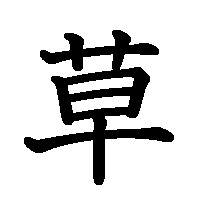About Japan's Internet slang "w"and"草"(meaning laugh)
Hello guys!!!
I'm Japaneeeeeeeese and This is my first article!!!
Today I will introduce you to "w"which expresses laughter which is Japan's Internet slang to you.

"w" means "lol" as it is in English-speaking countries. That is to say that they are laughing.
Origin
Originally people in Japan used "(笑)"(readings: wara) as a meaning of laughter.
By the way, there are three kinds of letters in Japanese, It's Hiragana,Katakana and Kanji.
For example
Hiragana:あ、い、う、え、お、か、き、く、け、こ...
Katakana:ア、イ、ウ、エ、オ、カ、キ、ク、ケ、コ...
Kanji:田,家,水,池,笑...
So "笑" which represents laughter was kanji.
When entering kanji by Japanese keyboard it is necessary to convert it once input with Roman letters.
But it is troublesome to convert each time, so people started to type "w" which is a short form of "wara" which is the Roman letters before conversion.
And when "w" began to be used in Japan 's big bulletin board, 2 channel, it spread quickly on the Internet.
In the past, it was so-called geek to use "w", but now it is becoming commonly penetrated by the popularization of social networking service (LINE and Twitter).
But now that w is commonly used, there are not many people who know this origin.
How to use "w"
The more the number of "w" is the more it feels to be laughing, the more you feel a sense of fun.
For example
- 俺が缶を蹴ったら靴下が破れたw
meaning:When I kicked the can, my socks broke w.
- 俺の弟の頭にコケが生えてたwwwwww
meaning:Moss was growing in my brother's head wwwww.
Adjust the number of w according to the level of laughter like this.
Other slang
But today I will introduce not only this but also another Internet slang showing laughter.
It is "草".
If you have Japanese friends try using this, it seems like a pretty geek www.

Origin
"草" is kanji and means grass.(readings: kusa)
Why use kanji meaning grass? Because 'w' which is lined up looks like grass.

↑ASCII art representing mowing lawn
"草" also already existed when "w" appeared.
However, it was not so popular at that time.
But the time passed "草" began to be used in "真夏の夜の淫夢"(Midsummer Night Dream)(※), a video in "Nico Nico Videos"(Japanese video site: http://www.nicovideo.jp/video_top).
(※)What is Midsummer Night Dream?(真夏の夜の淫夢,readings: manatunoyorunoinmu)

↑People famous for midsummer night dream("野獣先輩" readings: yajyusenpai, meaning: Seniors of wild beasts)
This is a so-called gay video and the serif of the person appearing in this video is an Internet slang.
In this movie, using "w" is regarded as straight guy, so "草" has been used instead.
Then it gradually became popular as it became used also for 2 channels and Niconico videos.
How to use "草"
草
readings: kusa.
meaning:laughing.
草生える
readings: kusahaeru.
meaning: to grow grass = laughing.
草不可避
readings: kusahukahi.
meaning:Grass inevitable = laughing.
大草原不可避
reading: daisougenhukahi.
meaning:Great prairie inevitable = big laughing.
Thank you for reading!
Maybe I am wrong because I am using google translation. If you have any mistakes, please reply! Well then a good internet trip!
Good to know. I knew about 笑, but I didn't know about W.
thx!
Congratulations @domison1012! You received a personal award!
Click here to view your Board
It also seems similar to the onomatopoeia for laughing "kusu kusu"
Congratulations @domison1012! You received a personal award!
You can view your badges on your Steem Board and compare to others on the Steem Ranking
Vote for @Steemitboard as a witness to get one more award and increased upvotes!